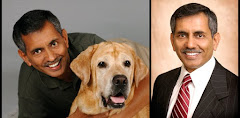Here are some recent examples of people using a vivid, evocative expression to emphasize something--examples which, I hope, will inspire the rest of us into similarly imaginative use of the language, especially when we are trying to break through the clutter.
1. Talking about the speed with which the U.S. military is acquiring robots, “Wired for War” author P.W. Singer said during a CBS interview: “We went into Iraq with a handful of drones; we now have 7,000 in inventory. We went into Iraq with zero unmanned ground vehicles that are robotic; we now have 12,000. And these are just the Model T Fords, the Wright Brothers flyers, compared to what’s coming.”
2. Earlier this month, speaking with ABC’s Christiane Amanpour about Princess Diana’s impact on the British monarchy, former British PM Tony Blair commented: “Buckingham Palace saw her as a threat because she was such a different type of person. For a very traditional monarchy, it was like a meteor coming in what had been a fairly well disciplined, well ordered ecosystem, and that obviously had a big impact on it, a big consequence.”
3. Asked why Mexico’s President Calderon criticized Arizona’s new immigration law during his last visit to the U.S.--criticism that, not surprisingly, created a brouhaha here--Jeffrey Davidow, president of the Institute of Americas, saying: “If Calderon had come in here and not mentioned the Arizona law and made something of a big deal about it, he would on his return be put on a spit and roasted slowly by the Mexican public. This is a big issue for them.”
4. With reference to why the Democrats have yet to see a political payoff from the health-care overhaul and other big initiatives of the past 12 to18 months, David Axelrod telling The Wall Street Journal: “We didn’t have a lot of cotton candy that tastes good right away but disappears quickly. What we had was some fiber that’s going to help people in the long run, but it doesn’t provide that immediate pop.”
1. Talking about the speed with which the U.S. military is acquiring robots, “Wired for War” author P.W. Singer said during a CBS interview: “We went into Iraq with a handful of drones; we now have 7,000 in inventory. We went into Iraq with zero unmanned ground vehicles that are robotic; we now have 12,000. And these are just the Model T Fords, the Wright Brothers flyers, compared to what’s coming.”
2. Earlier this month, speaking with ABC’s Christiane Amanpour about Princess Diana’s impact on the British monarchy, former British PM Tony Blair commented: “Buckingham Palace saw her as a threat because she was such a different type of person. For a very traditional monarchy, it was like a meteor coming in what had been a fairly well disciplined, well ordered ecosystem, and that obviously had a big impact on it, a big consequence.”
3. Asked why Mexico’s President Calderon criticized Arizona’s new immigration law during his last visit to the U.S.--criticism that, not surprisingly, created a brouhaha here--Jeffrey Davidow, president of the Institute of Americas, saying: “If Calderon had come in here and not mentioned the Arizona law and made something of a big deal about it, he would on his return be put on a spit and roasted slowly by the Mexican public. This is a big issue for them.”
4. With reference to why the Democrats have yet to see a political payoff from the health-care overhaul and other big initiatives of the past 12 to18 months, David Axelrod telling The Wall Street Journal: “We didn’t have a lot of cotton candy that tastes good right away but disappears quickly. What we had was some fiber that’s going to help people in the long run, but it doesn’t provide that immediate pop.”

